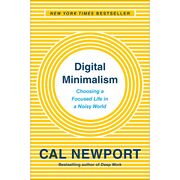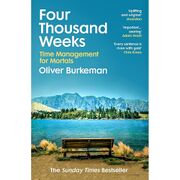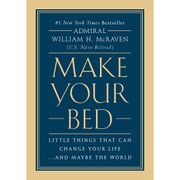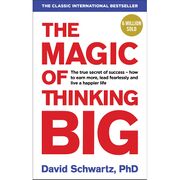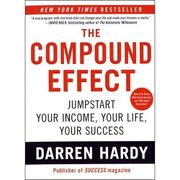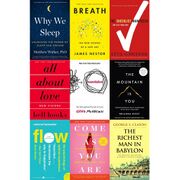The Greatest Salesman in the World
🍎 Healthy brain food
"Today I will be master of my emotions."
— Og Mandino, The Greatest Salesman in the World (1968)
Introduction
| The Greatest Salesman in the World | |
|---|---|
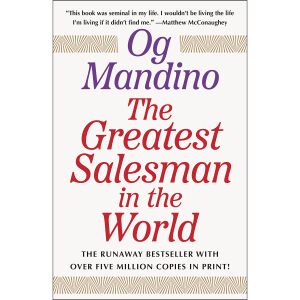 | |
| Full title | The Greatest Salesman in the World |
| Author | Og Mandino |
| Language | English |
| Subject | Salesmanship; Success; Personal development |
| Genre | Nonfiction; Self-help |
| Publisher | Frederick Fell |
Publication date | 1968 |
| Publication place | United States |
| Media type | Print (hardcover, paperback); e-book; audiobook |
| Pages | 108 |
| Goodreads rating | 4.2/5 (as of 6 November 2025) |
| Website | penguinrandomhouse.com |
The Greatest Salesman in the World is a compact self-help parable first published in New York in 1968 by Frederick Fell. The first edition runs 108 pages. It frames its teachings as ten “ancient scrolls” that coach readers in habits, persistence, love, emotional mastery, and allied disciplines meant to be practiced in daily life. [1] Told as a fable about Hafid, a young camel boy whose fortunes rise with each scroll’s lesson, the book adopts a plain, exhortative register to turn big ideas into repeatable actions. [1] It has remained a durable backlist hit, with more than five million copies in print. [1] The title has continued to chart on Publishers Weekly’s Religion Fiction lists and reached No. 1 on 14 August 2023 for the Bantam mass-market edition. [2]
Chapter summary
This outline follows the Bantam mass-market paperback edition (New York: Bantam, [1991], 111 pp., ISBN 978-0-553-27757-9).[3]
🛕 1 – Chapter One. In Damascus, the aging merchant Hafid studies his face in a bronze mirror, then walks across marble floors between black onyx columns to the warehouse that stretches five hundred paces behind his palace. There he asks his chief bookkeeper, Erasmus, to tally their fortune, which the bookkeeper estimates at more than seven million gold talents. Despite a record year that even included selling the Procurator in Jerusalem two hundred Arabian stallions, Hafid orders a halt to purchases and commands that everything be sold and converted to gold. He declares that he will give away his wealth to the city’s poor, transfer each emporium to its manager, and reward those managers with five thousand gold talents so they can restock as they wish. He further instructs Erasmus to place fifty thousand gold talents in his own name and to stay with him until an old promise is kept. Hafid explains that since his wife, Lisha, has died, his needs are simple and his time is short. The scene ends with a private vow to reveal the source of his success once the liquidation is complete, even as Erasmus struggles to understand the decision. Beneath the opulence, wealth serves a larger purpose, not itself. Character precedes commerce; values—not inventory—drive what comes next. Time is the most precious commodity I possess and the hour glass of my life is nearly filled.
🧭 2 – Chapter Two. A heavily guarded caravan leaves Damascus with title documents and gold, traveling manager by manager—Obed in Joppa, Reuel in Petra, and at last Antipatris—until every outpost has been notified of Hafid’s retirement and endowed as promised; the great trade empire is dissolved. With the warehouses emptied, Erasmus meets Hafid by the fountain in the peristyle and follows him up the inner stair to the room within the palace dome. At a landing Hafid pauses before a murrhine vase on a stand of citrus wood, watching sunlight turn the glass from white to purple, then unlocks a long-guarded chamber. In a shaft of light sits a small cedar chest; he unstraps the leather bindings, breathes the cedar scent, and lifts the lid to reveal leather scrolls. Hafid explains that all but one contain principles—laws written in a distinctive style—and that the first scroll teaches a method for learning the rest. Bound by an oath, he has shared their contents with no one, waiting instead for a sign that will identify the single person to receive them. He tells Erasmus that applying those teachings—not luck—built the fortune they have just given away. Method precedes mastery: disciplined reading and practice turn ideas into habits and results. Deliberate repetition fuses principles into personality so they can compound. When one masters these principles one has the power to accumulate all the wealth he desires.
🐪 3 – Chapter Three. Winter bites on the Mount of Olives as Pathros of Palmyra’s caravan lies near Bethpage, the Temple’s smoke drifting across the Kidron Valley, while inside a goat-hair tent the seasoned merchant questions a kneeling camel boy named Hafid. Hafid asks to become a seller like Hadad, Simon, and Caleb, not merely a handler of animals, and admits that love—meeting the daughter of Calneh in Hebron—has fired his ambition. Pathros challenges him on the purpose of wealth and warns that true wealth is of the heart—happiness, love, and peace of mind. Convinced the desire is real, he refuses to teach any “laws” yet and instead sets a trial, reminding Hafid that selling is often the loneliest profession. Obstacles, Pathros says, are allies that sharpen courage and skill, not enemies to flee. At dawn Hafid is to collect from Silvio a seamless robe woven of goat hair, dyed red with madder root, marked with Tola’s star and Pathros’s circle-within-a-square—the guild’s abeyah—and ride to Bethlehem. There he must sell it where others avoid the market, choosing his approach—marketplace at the south gate or door-to-door among more than a thousand dwellings—and set his own price, owing Pathros one silver denarius and keeping the rest. Ambition must be proved in the field under constraint, not in a classroom. Exposure and feedback from a single, high-stakes mission force persistence, judgment, and emotional control to develop together. Failure will never overtake you if your determination to succeed is strong enough.
🧣 4 – Chapter Four. Hafid pushes aside a half-eaten loaf of bread in a crowded Bethlehem inn and takes stock of a fourth fruitless day; the single red robe still lies in the pack on his animal, tethered to a stake in the cave behind the inn. He replays refusals as questions—why no one listens, why doors close after five words, why so many claim poverty—and briefly wonders if he should return to being a camel boy. Thinking of Lisha steadies him; he resolves to try again at dawn near the town well and to speak to everyone he can. The cold drives him to the cave, where frost stiffens the grass and a flicker of light makes him hurry toward his belongings. In the candlelight, a bearded man and a young woman huddle beside a manger carved from stone, while a newborn sleeps, its wrinkled skin still crimson. Hafid unties his pack, unrolls the robe, and sees the red dye glow and the marks he knows—the circle within a square of Pathros and Tola’s star—then crosses the straw. He returns the father’s tattered cloak and the mother’s as well, and wraps the infant in the robe. At the cave’s mouth he feels the young mother’s kiss on his cheek and steps into a night lit by the brightest star he has ever seen, tears running as he turns back toward Jerusalem. In scarcity, generosity signals character and makes later persuasion credible. Value comes before sale, building identity and trust long before any invoice.
🌟 5 – Chapter Five. On the road back through the Garden of Gethsemane, Hafid rehearses lies about bandits to explain why the robe is gone. The star that rose over Bethlehem trails him to the caravan, where he finds Pathros outside the great tent staring upward at its color and brightness. Pathros asks if Hafid has come directly from Bethlehem and whether he is alarmed that a star follows him; Hafid admits he had not noticed. Inside, the youth recounts the day’s rejections—the pottery merchant who throws him out, the Roman soldier who flings the robe in his face when he refuses to cut the price—and then tells of the cave, the couple, and the child. Pathros listens, then says the star has cured his own blindness; he will explain it fully in Palmyra. He asks Hafid to resume his duties until the sellers return, promising to address the future afterward. Performance becomes discernment: a courageous gift can outperform a compromised sale. Meaning-making under uncertainty—reading the star and the generosity—validates character even when revenue is zero. Sleep in peace for you have not failed.
🕊️ 6 – Chapter Six. Nearly a fortnight after the caravan returns to Palmyra, a gaunt Pathros summons Hafid from his straw cot to the master’s bedchamber. Coughing and spent, he says he cannot sell death from his door and has waited for a sign before passing on a small leather-strapped cedar chest kept beneath his bed. He recounts saving a traveler from the East from two bandits in his youth, being welcomed into the man’s family, and studying ten numbered leather scrolls for a year until he memorized them; when he left, a sealed letter and fifty gold pieces financed his start. The scrolls, he says, hold the secret of learning and the principles of selling success, along with a command to share half of any wealth and to withhold the scrolls until a sign reveals the next steward. The star above Bethlehem and Hafid’s gift of the robe are that sign. Pathros bequeaths the chest containing the scrolls and a purse of one hundred gold talents, and sets three conditions: swear to follow the reading method on the scroll marked One, distribute half of all earnings to the less fortunate, and pass the chest to the next person identified by a sign. He directs Hafid to seek opportunity in Damascus, promising that policy and practice will produce wealth enough on their own. Apprenticeship works through ritual: a precise sequence of daily reading and disciplined action transfers truth better than tips, while commitment within constraints—oath, alms, stewardship—lets growth compound inside moral boundaries. Depart from this city immediately and go to Damascus.
🌙 7 – Chapter Seven. Hafid enters Damascus through the East Gate and rides along the Street Called Straight, the cries from hundreds of bazaars rising on both sides as merchants thrust their goods at passersby. The din unsettles him; he sees sellers competing by volume and bluster and feels, for a moment, very much the camel boy again with a cedar chest and an oath heavier than his pack. He steers clear of the shouting stalls and studies how buyers actually move, noticing how crowds gather more readily for warmth and welcome than for hard bargaining. The city’s scale makes his assignment feel impossible, yet the memory of Pathros’s charge—to leave Palmyra, keep faith, and begin again in Damascus—stiffens his resolve. He chooses observation over panic, counting rhythms of the market and the lulls when conversation is possible. The chest stays closed; he will not skim or rush what was entrusted to him. By nightfall he has mapped streets, gates, and squares in his head and picked the quiet hours he can use to practice without distraction. He narrows the gap between fear and action by pivoting from noise to noticing, from spectacle to craft. Deliberate exposure—starting in the hardest market—makes method, not bravado, his edge.
📜 8 – The Scroll Marked I. The first scroll announces a beginning: shed the old skin and start anew, as if reborn in a vineyard rich with fruit. It prescribes a ritual more exacting than any single sale—read the words on waking, read again after the midday meal, and read them aloud before sleep for thirty days, then move to the next scroll in the same manner. The aim is not information but implantation, so the phrases seep from the active mind into the “other” mind that never rests and steers conduct when willpower fades. Repetition turns friction into fluency; fluency turns effort into appetite; appetite makes the behavior self-propelling. The scroll also warns against treating brevity as simplicity—thousands of grapes were pressed so one jar could hold a distilled truth. It promises energy at dawn and patience at dusk as new habits take root, and it frames failure as a rejected payment, not a permanent condition. Method before mastery, cadence before confidence. Spaced, vocalized rehearsal rewires attention and identity, aligning character—the lever of commerce—with a daily drill. Today I begin a new life.
❤️ 9 – The Scroll Marked II. The second scroll insists that love—not force, cunning, or perfect timing—is the only key that reliably opens a buyer’s heart. Love greets every person first, softening the “wall of suspicion and hate” before any pitch, and it trains the eye to magnify virtues and forgive faults, because flaws instruct as surely as strengths inspire. It asks for discipline: to bless the hostile, to praise the shy, to ignore gossip, to give warmth before asking attention, and to hold words until irritation cools. Love is not sentiment; it is a sales practice that changes posture at the door and tone in the first line, making rejection less final and rapport more likely. The scroll widens its scope to the day itself—love the weather, the setbacks, and the tedium—so discouragement finds little purchase. It holds that without love a technician fails, while with love even an amateur can advance. Persuasion begins with regard for people and ends with respect as safeguard. Cognitive reappraisal trains perception to seek dignity and common cause so emotions and behavior follow. I will greet this day with love in my heart.
💪 10 – The Scroll Marked III. The third scroll draws its lesson from the bullring: in the East, young bulls are rated by how often they charge the picador again after the sting of the lance, courage marked not by one rush but by returns. It reframes progress as a hidden curve—prizes lie at the end of journeys, and success may sit just beyond the next turn, invisible until the final steps are taken. Each day’s labor is one blow against a mighty oak; no single stroke fells it, yet childish swipes, repeated, bring it down. The scroll arms the reader with a practical hedge: bend the ancient law of averages by increasing attempts, knowing each “no” makes the next “yes” more probable. It bans a failure’s vocabulary—quit, cannot, impossible—and counters fatigue with a concrete rule: when evening comes, make one more call. It guards against yesterday’s victories by naming complacency the great foundation of failure, then resets the day at dawn. Endurance becomes a measurable cadence of action rather than a mood. Exposure by volume builds antifragility: repeated, purposeful tries shrink fear, compound skill, and make luck likelier. I will persist until I succeed.
🌿 11 – The Scroll Marked IV. Unrolling the fourth scroll, the text declares a radical uniqueness: no one before, living now, or yet to come shares the same mind, heart, eyes, ears, hands, or mouth, and that difference is an asset to be displayed, not hidden. It warns against imitation and directs a seller to proclaim distinction in the marketplace and apply the same standard to the goods offered. Rarity carries value, yet potential withers without use, so skill and character must be worked like muscle until they strengthen beyond yesterday’s effort. The scroll urges a shift from self-congratulation to striving, to “strain” capacity rather than polish past deeds. It prescribes boundary-keeping—home and market kept separate—so attention can be total wherever the feet stand. It reframes setbacks as opportunities in disguise and urges looking beyond appearances to the work at hand. Taken together, these moves turn identity into a competitive advantage grounded in disciplined focus. Selective attention and clear boundaries make rarity visible in practice. I am nature's greatest miracle.
⏳ 12 – The Scroll Marked V. The fifth scroll compresses life into a single sealed container: one day that will not spill a drop into the sand of yesterday or borrow from the jar of tomorrow. It refuses nostalgia with a row of rhetorical checks—the sun will not rise where it sets, the hourglass will not run backward, errors will not be relived—and returns effort to the present. Duties are immediate and concrete: hold children while they are young, embrace the beloved, lift a friend in need, give oneself to work before the light fades. Urgency turns into throughput: make more calls than before, sell more goods than before, earn more gold than before, and let each minute eclipse hours of prior days. If this day proves not to be the last, gratitude closes the ledger and prepares the next morning. Time is a stern partner that rewards only present action and punishes delay. Living inside a 24-hour boundary uses temporal scarcity to strip excuses and heighten productive behavior aligned with the method. I will live this day as if it is my last.
🎭 13 – The Scroll Marked VI. The sixth scroll maps mood to nature’s cycles: tides advance and recede, seasons turn, the sun rises and sets, birds arrive and depart, flowers bloom and fade, and inside each person a wheel turns from joy to sadness and back again. Because commerce mirrors weather, the seller must make his own climate: bring gloom and buyers return gloom; bring brightness and they reflect brightness into sales and a granary of gold. It offers a “plan of battle” that uses action to reset feeling—sing when depressed, laugh when sad, double labor when ill, plunge ahead when afraid, dress well when feeling inferior, speak up when uncertain. It also cautions against the smiling enemies of effort: overconfidence, overindulgence, complacency, pride, and the illusion of invincibility, each answered by recalling failure, hunger, competition, shame, and the humbling scale of the stars. Empathy extends the rule outward: do not judge a prospect by one meeting; call again tomorrow, knowing moods change. This approach turns emotion from fate to discipline. Action-first rules and counterweights tame volatility and sync behavior to results, keeping character in command. Today I will be master of my emotions.
😂 14 – The Scroll Marked VII. The seventh scroll crowns the method with levity, claiming a human monopoly on laughter and calling it a habit to cultivate. Laughter is practical physiology: smiles aid digestion, chuckles lighten burdens, and mirth lengthens life, the “great secret” now to be used. Perspective is the tool: laugh first at oneself, then at the world, so triumphs and troubles shrink to size against the river of centuries. To hold balance in storms or surfeit, four short words serve as ballast—repeated under pressure to restore scale and calm. Laughter is also salescraft: smiles beget smiles, and those who receive frowns buy nothing; tears are reserved for sweat. By refusing to be solemn about petty things, the seller stays energetic, likable, and resilient through rejection and reward alike. This is not frivolity but right-sized seriousness, using humor and a four-word ballast to puncture distortions and keep action moving. I will laugh at the world.
📈 15 – The Scroll Marked VIII. The scroll begins with tangible transformations: a mulberry leaf becomes silk, a field of clay a castle, a cypress a shrine, and a cut of sheep’s hair raiment fit for a king; value multiplies when touched by skill. It shifts to agriculture’s math, comparing a life to a grain of wheat that can be fed to swine, ground to bread, or planted so one kernel yields a thousand more. Growth, it says, starts in darkness—failures, despairs, and ignorance as soil—and then requires rain, sun, and warm winds before harvest. Method turns metaphor into practice: set goals for the day, week, month, year, and life, using one’s best past performance as the baseline to be multiplied by a hundred. Aim high—better to throw the spear at the moon and strike only an eagle than settle for a rock—and expect to stumble, then rise. Announce goals aloud so words become bonds, yet let others proclaim accomplishments; humility protects progress. The standard is simple and relentless: surpass yesterday’s actions, raise goals the moment they are met, and do the work a failure will not do. Even the city-feeding arithmetic appears: one grain multiplied a hundredfold, then repeated ten times, could sustain the world’s hunger. Ambition turns concrete—measured, public commitments that compound. Deliberate goal escalation and identity-anchored repetition align growth with market value so character compounds like capital. Today I will multiply my value a hundredfold.
⚡ 16 – The Scroll Marked IX. Here the rhetoric drops its anchor in action: maps do not carry owners an inch, parchments of law prevent no crime, and even this very scroll earns not a penny without movement. The refrain hammers fear into size—action reduces the lion of terror to an ant of equanimity—and prescribes a conditioning drill: repeat a short command each hour until it becomes as reflexive as blinking. Concrete contrasts set the bar: leap from the cot while the failure sleeps, confront the first prospect while the failure hesitates, knock on the door the failure fears, and call on ten while the failure plans to call on one. Nature supplies the model; be as the firefly whose light shows only in flight, not as a butterfly preening for a flower’s charity. The calendar is exposed as a trap—tomorrow never comes—so tasks migrate back to now even if the result is uncertain. The cadence tightens: when tempted to delay, close one more sale; when appetite flags, take one more step; when doubt gathers, speak and move. A final spur declares the window brief—success will not wait; this is the time, this is the place. Courage becomes throughput: motion, not mood, sets value in the marketplace. Cue-based activation and volume—using a trigger phrase to drive frequent, focused attempts—tilt skill and luck in one’s favor. I will act now.
🙏 17 – The Scroll Marked X. The last scroll starts with a reflex: in danger every creature cries for help, eyelids blink, knees jerk, and the mouth says “My God”; instinct itself is an argument for prayer. It restricts the request, refusing gold, garments, or petty victories, asking only for direction so that ability might grow to match opportunity. It treats silence as an answer too—guidance may come or not, but both responses still guide—and then lays out a salesman’s prayer in plain petitions. Teach me to hunt with words and prosper with love; assign me tasks where others failed and courage to laugh at my misgivings; spare me sufficient days yet help me live this one as if it were my last. Guide my speech to bear fruit and restrain gossip; train me to use the law of averages; bathe me in good habits and compassion; let all things pass and let me count my blessings. Fill my cup with love so strangers become friends; keep me humble at victory’s edge and steady in defeat. Close with vocation and vine: I am a small grape in your vineyard; show me the way and let me become what you intended when my seed was planted. Ambition sits under authority; conscience and petition set the compass for enterprise. Daily calibration—asking for right aims and steady means—channels effort into service and resilience rather than vanity. I will pray for guidance.
Background & reception
🖋️ Author & writing. Og Mandino was a widely read inspirational author and former president of Success Unlimited; he received the Napoleon Hill Gold Medal for literary achievement and recognition from the National Speakers Association. [4] The book first appeared in 1968 with Frederick Fell (108 pp.), establishing the ten-scroll framework that powers its narrative arc. [5] Bantam later reissued the work; WorldCat records that reprint as “Reprint of the 1968 edition published by F. Fell, New York.” [6] Current Penguin listings show later formats, including a 2025 Bantam Dell paperback of 112 pages. [7]
📈 Commercial reception. Publisher materials report “more than five million copies in print,” consistent with the title’s long backlist life. [1] Publishers Weekly sales history for the Bantam edition shows recurring placements on the Religion Fiction list, including a No. 1 peak dated 14 August 2023. [2]
👍 Praise. High-profile readers have pointed to the book’s practical influence: Sports Illustrated reported that Rory McIlroy “continually refers” to Mandino’s book as a guidebook, and Golf.com likewise quoted him as returning to it “every now and again.” [8][9] Separately, The Washington Post noted that Og Mandino’s ethos of positivity and persistence “transformed” Matthew McConaughey when he discovered the book in college. [10]
👎 Criticism. In the same review, The Washington Post characterized Mandino’s style as a “bottomless resource for Successories posters,” deploying that frame to question the depth of similar self-help maxims. [10]
🌍 Impact & adoption. Public comments from elite athletes and ongoing reissues keep the book in circulation across performance and training circles. McIlroy’s remarks in 2019–2020 helped renew attention to the book’s scroll-based practice approach, while contemporary PRH/Bantam listings reflect continued retail availability across formats. [11][7]
Related content & more
YouTube videos
CapSach articles
Enjoyed this page?
📚If this page The Greatest Salesman in the World inspired or helped you today, a small coffee helps us keep creating and sharing more. Your support truly matters.👏
References
- ↑ 1.0 1.1 1.2 1.3 "The Greatest Salesman in the World". Penguin Random House. Penguin Random House. 6 May 2025. Retrieved 6 November 2025.
- ↑ 2.0 2.1 "Publishers Weekly Bestseller Lists — Religion Fiction". Publishers Weekly. Retrieved 6 November 2025.
Sales history for The Greatest Salesman in the World: Highest Rank 1; Highest Rank Date 08/14/2023
- ↑ "The greatest salesman in the world". WorldCat. OCLC. Retrieved 6 November 2025.
- ↑ "Og Mandino". Penguin Random House. Penguin Random House. Retrieved 6 November 2025.
- ↑ "The greatest salesman in the world". Internet Archive. F. Fell. 1968. Retrieved 6 November 2025.
108 p.; New York: F. Fell
- ↑ "The greatest salesman in the world". WorldCat. OCLC. Retrieved 6 November 2025.
Reprint of the 1968 edition published by F. Fell, New York
- ↑ 7.0 7.1 "The Greatest Salesman in the World". Penguin Books Australia. Penguin Random House Australia. 12 August 2025. Retrieved 6 November 2025.
- ↑ "2020 U.S. Open: Rory McIlroy on his own kind of winning". Sports Illustrated. 8 September 2020. Retrieved 6 November 2025.
- ↑ "Masters 2019: Rory McIlroy says 5 books helped him play better golf". Golf.com. 10 April 2019. Retrieved 6 November 2025.
- ↑ 10.0 10.1 Athitakis, Mark (20 October 2020). "Matthew McConaughey is 'alright, alright, alright' — and thinks you will be too". The Washington Post. Retrieved 6 November 2025.
- ↑ "Rory gets a good read". PGA TOUR. 10 March 2020. Retrieved 6 November 2025.

